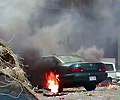


It is a vast early Christian monastic complex in Cappadocia, Turkey. Keşlik Monastery consists of two churches and courtyards. It has a large refectory and many cave rooms. In Byzantine times, churches and rooms for various uses were cut into the rocks. All the work done here did not follow any design pattern. As time passed, the cells for monks were added in a rather chaotic manner.



The single-nave St. Stefan Church, probably from the 8th century, contains several graves in the floor. The chapel has simple decorations of the iconoclastic period. There is a thin cross on the ceiling. The vines around the cross represents the followers of Jesus who became God's people through the cross.


The two-nave St. Michael Church was originally very richly decorated with paintings. Only fragments of decorations have survived. On the walls we can recognize images of Jesus and scenes from the Bible. One scene describes Jesus Haling the Paralytic.



The monks’ dining hall, the refectory, had two parallel tables with an arcade wall between them, all carved out of the rock. Tables are narrow, but long. They could accommodate over 100 people.




